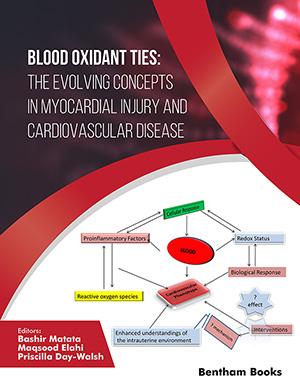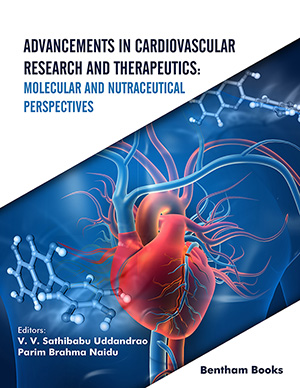
Abstract
Cardiovascular and neurological diseases cause substantial morbidity and mortality globally. Moreover, cardiovascular diseases are the leading cause of death globally. About 17.9 million people are affected by cardiovascular diseases and 6.8 million people die every year due to neurological diseases. The common neurologic manifestations of cardiovascular illness include stroke syndrome which is responsible for unconsciousness and several other morbidities significantly diminished the quality of life of patients. Therefore, it is prudent need to explore the mechanistic and molecular connection between cardiovascular disorders and neurological disorders. The present review emphasizes the association between cardiovascular and neurological diseases specifically Parkinson’s disease, Alzheimer’s disease, and Huntington’s disease.
Keywords: Cardiovascular disorders, neurological disorders, Alzheimer’s disease, Parkinson’s disease, Huntington’s disease, oxidative stress.
[http://dx.doi.org/10.1002/ptr.7727] [PMID: 36690605]
[http://dx.doi.org/10.4239/wjd.v5.i4.444] [PMID: 25126392]
[http://dx.doi.org/10.1016/S1474-4422(18)30499-X] [PMID: 30879893]
[http://dx.doi.org/10.3390/ijms21124424] [PMID: 32580329]
[http://dx.doi.org/10.1111/nyas.14507] [PMID: 33040363]
[http://dx.doi.org/10.1007/s00059-021-05022-5] [PMID: 33544152]
[http://dx.doi.org/10.1007/s11325-019-01970-9] [PMID: 31786748]
[http://dx.doi.org/10.2174/1570159X18666200131105418] [PMID: 32003695]
[http://dx.doi.org/10.3390/molecules27154970] [PMID: 35956919]
[http://dx.doi.org/10.3390/ijms23136954] [PMID: 35805958]
[http://dx.doi.org/10.1007/s12035-022-03164-z] [PMID: 36562884]
[http://dx.doi.org/10.1146/annurev-genet-112618-043515] [PMID: 31518519]
[http://dx.doi.org/10.3389/fnhum.2017.00316] [PMID: 28676747]
[http://dx.doi.org/10.1016/j.jacc.2019.12.033] [PMID: 32130931]
[http://dx.doi.org/10.2174/1567205010666131119235254] [PMID: 24251393]
[http://dx.doi.org/10.1016/S2468-2667(20)30185-7] [PMID: 33271079]
[http://dx.doi.org/10.1080/00325481.2019.1657776] [PMID: 31424301]
[http://dx.doi.org/10.2174/0929867328666210921161711] [PMID: 34547993]
[http://dx.doi.org/10.1007/s10522-021-09910-5] [PMID: 33502634]
[http://dx.doi.org/10.3390/biom13121736] [PMID: 38136607]
[http://dx.doi.org/10.7150/thno.44152] [PMID: 33052247]
[http://dx.doi.org/10.1007/s12017-008-8044-z]
[http://dx.doi.org/10.1007/s00395-021-00897-1] [PMID: 34601654]
[http://dx.doi.org/10.1038/s41582-019-0228-7] [PMID: 31367008]
[http://dx.doi.org/10.3390/ijms21176336] [PMID: 32882843]
[http://dx.doi.org/10.1016/j.pneurobio.2006.09.003] [PMID: 17188795]
[http://dx.doi.org/10.1016/S1474-4422(09)70062-6] [PMID: 19296921]
[http://dx.doi.org/10.1016/j.imlet.2021.10.003] [PMID: 34688722]
[http://dx.doi.org/10.1016/j.cca.2021.08.009] [PMID: 34389279]
[http://dx.doi.org/10.1016/j.ntt.2022.107124] [PMID: 36183913]
[http://dx.doi.org/10.1016/j.neubiorev.2021.02.037] [PMID: 33657433]
[http://dx.doi.org/10.1007/s11064-007-9482-y] [PMID: 17940895]
[http://dx.doi.org/10.1155/2019/9570616] [PMID: 31885827]
[http://dx.doi.org/10.3390/ijms24065079] [PMID: 36982153]
[http://dx.doi.org/10.3390/cells11030552] [PMID: 35159361]
[http://dx.doi.org/10.3389/fimmu.2018.00754] [PMID: 29706967]
[http://dx.doi.org/10.3389/fendo.2023.1243132] [PMID: 37867511]
[http://dx.doi.org/10.1016/j.expneurol.2009.03.019]
[http://dx.doi.org/10.4330/wjc.v12.i8.373] [PMID: 32879702]
[http://dx.doi.org/10.1002/mds.29228] [PMID: 36161673]
[http://dx.doi.org/10.1007/s12035-021-02556-x] [PMID: 34519969]
[http://dx.doi.org/10.3233/JHD-130054] [PMID: 25062674]
[http://dx.doi.org/10.4161/auto.6502] [PMID: 18612262]
[http://dx.doi.org/10.1016/j.arr.2021.101358] [PMID: 33979693]
[http://dx.doi.org/10.1007/s12012-015-9318-y] [PMID: 25800750]
[http://dx.doi.org/10.1186/s12883-019-1556-3] [PMID: 31823737]
[http://dx.doi.org/10.1373/49.10.1726] [PMID: 14500613]
[PMID: 22180703]
[http://dx.doi.org/10.1074/jbc.M511007200] [PMID: 16595690]
[http://dx.doi.org/10.1007/s00702-014-1180-8] [PMID: 24578174]
[http://dx.doi.org/10.1523/JNEUROSCI.22-20-09134.2002]
[http://dx.doi.org/10.2174/138161280505230110101259] [PMID: 10213800]
[http://dx.doi.org/10.1111/j.1476-5381.2011.01480.x]
[http://dx.doi.org/10.1177/1073858420972662] [PMID: 33198566]
[http://dx.doi.org/10.3390/ijms20225674] [PMID: 31766111]
[http://dx.doi.org/10.1038/s41582-020-0389-4] [PMID: 32796930]
[http://dx.doi.org/10.1161/CIRCRESAHA.116.307547] [PMID: 27081110]
[http://dx.doi.org/10.1111/hdi.12327] [PMID: 26104969]
[PMID: 35911274]
[http://dx.doi.org/10.3390/ijms22189987] [PMID: 34576151]
[http://dx.doi.org/10.1111/1440-1681.13326] [PMID: 32304254]
[http://dx.doi.org/10.3390/cells9030740] [PMID: 32192190]
[http://dx.doi.org/10.1093/ijnp/pyaa097] [PMID: 33315097]
[http://dx.doi.org/10.3390/ijms20112833] [PMID: 31212580]
[http://dx.doi.org/10.1161/CIRCRESAHA.113.300536] [PMID: 24436432]
[http://dx.doi.org/10.3390/ijms21155301] [PMID: 32722591]
[http://dx.doi.org/10.1152/ajpheart.00108.2003] [PMID: 12738623]
[http://dx.doi.org/10.1172/JCI71171] [PMID: 24177427]
[http://dx.doi.org/10.1152/ajpendo.00158.2021] [PMID: 34056923]
[http://dx.doi.org/10.1016/j.biopha.2022.113146] [PMID: 35643064]
[http://dx.doi.org/10.1097/MAJ.0b013e31828a6a01] [PMID: 23531958]
[http://dx.doi.org/10.3390/ijms22020623] [PMID: 33435513]
[http://dx.doi.org/10.1002/jcp.27603] [PMID: 30317615]
[http://dx.doi.org/10.1590/S1679-45082015RB3438] [PMID: 26466066]
[http://dx.doi.org/10.1161/ATVBAHA.113.301655] [PMID: 24436368]
[http://dx.doi.org/10.1161/ATVBAHA.112.300930] [PMID: 23887641]
[http://dx.doi.org/10.1016/j.lfs.2020.117720] [PMID: 32360620]
[http://dx.doi.org/10.1177/2050312120965752] [PMID: 33194199]
[http://dx.doi.org/10.1016/j.jjcc.2018.05.010] [PMID: 29907363]
[http://dx.doi.org/10.2174/0929866529666220622124253] [PMID: 35733308]
[PMID: 32635978]
[PMID: 32863249]
[http://dx.doi.org/10.1016/j.arr.2018.10.002] [PMID: 30326283]
[http://dx.doi.org/10.3390/biology11071063] [PMID: 36101441]
[http://dx.doi.org/10.1111/j.1749-6632.2012.06525.x] [PMID: 22548651]
[http://dx.doi.org/10.1177/1179546819839411] [PMID: 30967748]
[http://dx.doi.org/10.36660/abc.20190368] [PMID: 32876194]
[http://dx.doi.org/10.1016/j.cardfail.2016.07.282]
[PMID: 34404991]
[http://dx.doi.org/10.1016/j.bbrc.2011.10.020] [PMID: 22020095]
[http://dx.doi.org/10.4103/ijmr.IJMR_1566_17] [PMID: 31571628]
[http://dx.doi.org/10.5812/amh.59774]
[http://dx.doi.org/10.1186/s12929-020-0622-x] [PMID: 31987051]
[http://dx.doi.org/10.3390/ijms21031170] [PMID: 32050617]
[http://dx.doi.org/10.1371/journal.pone.0117698] [PMID: 25739024]
[http://dx.doi.org/10.1097/FBP.0000000000000324] [PMID: 28704274]
[http://dx.doi.org/10.1016/j.tins.2008.11.007] [PMID: 19162340]
[PMID: 25392442]
[http://dx.doi.org/10.1001/jamanetworkopen.2019.0154] [PMID: 30821823]
[http://dx.doi.org/10.1161/CIRCRESAHA.118.312563] [PMID: 30355078]
[http://dx.doi.org/10.2174/1568007033482959] [PMID: 12769802]
[http://dx.doi.org/10.1186/s13293-017-0152-8] [PMID: 29065927]
[http://dx.doi.org/10.12669/pjms.293.3629] [PMID: 24353640]
[http://dx.doi.org/10.1016/j.phyplu.2021.100188]
[http://dx.doi.org/10.1161/CIRCRESAHA.116.308427] [PMID: 28154097]
[http://dx.doi.org/10.1146/annurev.pharmtox.48.113006.094742] [PMID: 18834313]
[http://dx.doi.org/10.4103/0971-6866.132750] [PMID: 24959010]
[http://dx.doi.org/10.1016/j.neuron.2019.03.013] [PMID: 30946828]
[PMID: 28988575]
[http://dx.doi.org/10.3390/cells9040812] [PMID: 32230947]
[http://dx.doi.org/10.3390/nu12072021] [PMID: 32645995]
[http://dx.doi.org/10.1007/s11892-016-0775-x] [PMID: 27491830]
[http://dx.doi.org/10.1016/j.cjca.2017.12.005] [PMID: 29459239]
[http://dx.doi.org/10.3390/medicina56100499] [PMID: 32987813]
[http://dx.doi.org/10.1161/CIRCRESAHA.120.316101] [PMID: 32437302]
[http://dx.doi.org/10.3233/BPL-180069] [PMID: 30564545]
[http://dx.doi.org/10.1177/0003319720910669] [PMID: 32233780]
[http://dx.doi.org/10.3390/jcdd4010003] [PMID: 29367535]
[http://dx.doi.org/10.1161/HYPERTENSIONAHA.113.02189] [PMID: 24126175]
[http://dx.doi.org/10.1016/j.jacc.2019.10.009] [PMID: 31727292]
[http://dx.doi.org/10.4103/ipj.ipj_64_19] [PMID: 31879441]
[http://dx.doi.org/10.1007/s11883-004-0056-z] [PMID: 15191699]
[http://dx.doi.org/10.1002/acn3.732] [PMID: 31019987]
[http://dx.doi.org/10.1016/j.jacl.2009.11.003] [PMID: 20802793]
[http://dx.doi.org/10.3389/fcvm.2021.810810] [PMID: 35004919]
[http://dx.doi.org/10.1161/ATVBAHA.113.303116] [PMID: 24526691]
[http://dx.doi.org/10.1093/med/9780190233563.003.0004]
[http://dx.doi.org/10.1186/s12933-018-0762-4] [PMID: 30170598]
[http://dx.doi.org/10.1007/s00424-021-02619-x] [PMID: 34518916]
[http://dx.doi.org/10.2478/acph-2022-0002] [PMID: 36651531]
[http://dx.doi.org/10.3389/fphar.2023.1115721] [PMID: 36817151]
[http://dx.doi.org/10.3389/fendo.2021.667066] [PMID: 34168615]
 24
24 2
2

















